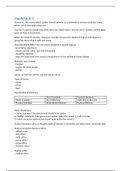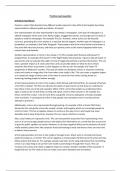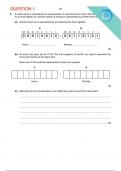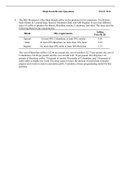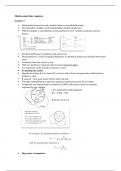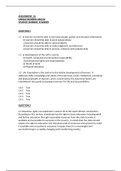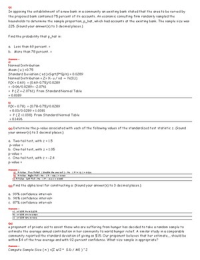Hoofdstuk 1
Economics: the science which studies human behavior as a relationship between ends and scarce
means which have alternative uses
Scarcity: if a person would have ample time and ample means, all ends can be realized and the agent
does not have to economize
Ethics: the study of morality. Velasquez: morality concerns the standards that an individual or a
group has about what is right and wrong
Moral standards differ from non-moral standards in several aspects:
- prescriptive statements
- should overrule other, non-moral standards
- should be impartial
- deal with issues that have serious consequences for the welfare of human beings
Examples moral values
- freedom
- respect for other people
- justice
Values can both be intrinsic and extrinsic in nature
Types of norms:
- moral
- social
- legal
Classification of dilemmas
Moral standard Practical standard
Moral standard Moral dilemma Motivational dilemma
Practical standard Motivational dilemma Practical dilemma
Policy should have:
1. Value statement: the government should foster goal x
2. Positive statement: if the government applies policy instrument y, x will increase
3. Policy conclusion: government should apply policy instrument y
General normative ethics is the philosophical attempt to formulate and defend basic moral principles
General normative business ethics:
- utilitarianism
- duty ethics
- rights ethics
- justice ethics
- virtue ethics
- business ethics
Applied ethics:
- medical ethics
,- engineering ethics
- journalistic ethics
- business ethics
Microeconomic ethics evaluates the actions of individual economic agents given the economic
structures or institutions
Macroeconomic ethics consider the morality of economic structures
Economic ethics cannot be sharply distinguished from business ethics
Free markets are supposed to respect:
- right to freedom
- right to private property
Unintended consequences: although the businessman intends to serve his own interest, the
consequence of his action also serves the interests of his customers and the community
Criticism free market:
-Perfect markets allow large inequalities
- people have rights to liberty and property as self-evident, but this assumption is unproven
- ignore the demands of caring
Characteristics utilitarianism:
-consequentialism
- welfarism
- sum ranking
Hoofdstuk 2
Consequentialism: actions, choices or policies should only be judged on the resulting effects, rather
than by any intrinsic value they may have
Welfarism: mental state like happiness or pleasure (pleasure ranking as +, pain as -)
The greatest happiness principle is the greatest balance of pleasures over pain, both in quantity and
quality
Utility should be equated to the satisfaction of actual preferences of individuals
Utility is a formal attribute, a common denominator, according to which all specific quests for
satisfaction can be ranked
Maximizing total welfare means that the marginal utility of different persons should be equalized
Numbers do not reduce obligation
Do A if the benefits exceed those of the next best alternative course of action; if not, don’t
Steps accepting projects with greatest benefits:
1. Investigate the relevant alternatives
2. Trace the consequences of these alternatives and who are affected by these consequences
3. Determine the numerical valuation of these consequences by these individuals
4. To deduce the change in the total social welfare by adding up the changes in individual welfare
Best policy maximizes the sum of the ‘willingness to pay’ scales of all affected individuals
, Problems of utilitarianism
Consequentialism Welfarism Sum ranking
No intrinsic value of rights Happiness is not the only Value free interpersonal
valuable thing comparison of utilities
impossible
No consideration of intentions Utility does not adequately No distributive justice
represent well being
Disregards retributive justice Problem of How to count future
incommensurability generations
Consequences are difficult to Immoral preferences How to determine the number
predict of people
Non rational preferences How to count animals
No community valuation Over-demandingness
Rule-utilitarianism: utilitarianism can only be applied to rules, not to concrete actions in a particular
situation
Restricting utilitarianism to rules only will ensure that the protection of rights and justice will be
more taken into consideration
Hoofdstuk 3
Pareto improvement: it makes on or more people in society better off, without making anyone worse
off.
Pareto optimality will exist if no further changes of this kind are possible. Only focuses on efficiency
and does not consider the fairness of the outcome of perfect markets
The argument economists use when defending the ideal of perfect market can be divided in steps:
1. Suppose that one accepts that individual well-being can be identified with the satisfaction of actual
preferences
2. And that one accepts the moral principle of minimal benevolence that, other than things being
equal, it is morally good if one person is better off
3. Competitive equilibriums are pareto efficient
4. All pareto efficient states of affairs can be obtained as competitive general equilibriums given the
right initial distribution of endowments to individuals
Combining these four premises, economists will conclude that perfectly competitive economies are
morally desirable and market failures are morally bad, and that adjusting the initial distribution of
financial and human endowments can satisfy all other moral concerns.
Perfect competitive markets satisfy efficiency in 3 aspects
- perfectly competitive market results in an efficient distribution of products among consumers
- a perfectly competitive economy results in efficiency in the use of different production factors
- perfect competitive markets will produce efficiency in output
Implicit premises welfare theorem that are open to considerable doubt:
- assumes that individuals are rational
- since pareto criterion combines consequentialism and welfarism, it is subject to the moral criticisms
Economics: the science which studies human behavior as a relationship between ends and scarce
means which have alternative uses
Scarcity: if a person would have ample time and ample means, all ends can be realized and the agent
does not have to economize
Ethics: the study of morality. Velasquez: morality concerns the standards that an individual or a
group has about what is right and wrong
Moral standards differ from non-moral standards in several aspects:
- prescriptive statements
- should overrule other, non-moral standards
- should be impartial
- deal with issues that have serious consequences for the welfare of human beings
Examples moral values
- freedom
- respect for other people
- justice
Values can both be intrinsic and extrinsic in nature
Types of norms:
- moral
- social
- legal
Classification of dilemmas
Moral standard Practical standard
Moral standard Moral dilemma Motivational dilemma
Practical standard Motivational dilemma Practical dilemma
Policy should have:
1. Value statement: the government should foster goal x
2. Positive statement: if the government applies policy instrument y, x will increase
3. Policy conclusion: government should apply policy instrument y
General normative ethics is the philosophical attempt to formulate and defend basic moral principles
General normative business ethics:
- utilitarianism
- duty ethics
- rights ethics
- justice ethics
- virtue ethics
- business ethics
Applied ethics:
- medical ethics
,- engineering ethics
- journalistic ethics
- business ethics
Microeconomic ethics evaluates the actions of individual economic agents given the economic
structures or institutions
Macroeconomic ethics consider the morality of economic structures
Economic ethics cannot be sharply distinguished from business ethics
Free markets are supposed to respect:
- right to freedom
- right to private property
Unintended consequences: although the businessman intends to serve his own interest, the
consequence of his action also serves the interests of his customers and the community
Criticism free market:
-Perfect markets allow large inequalities
- people have rights to liberty and property as self-evident, but this assumption is unproven
- ignore the demands of caring
Characteristics utilitarianism:
-consequentialism
- welfarism
- sum ranking
Hoofdstuk 2
Consequentialism: actions, choices or policies should only be judged on the resulting effects, rather
than by any intrinsic value they may have
Welfarism: mental state like happiness or pleasure (pleasure ranking as +, pain as -)
The greatest happiness principle is the greatest balance of pleasures over pain, both in quantity and
quality
Utility should be equated to the satisfaction of actual preferences of individuals
Utility is a formal attribute, a common denominator, according to which all specific quests for
satisfaction can be ranked
Maximizing total welfare means that the marginal utility of different persons should be equalized
Numbers do not reduce obligation
Do A if the benefits exceed those of the next best alternative course of action; if not, don’t
Steps accepting projects with greatest benefits:
1. Investigate the relevant alternatives
2. Trace the consequences of these alternatives and who are affected by these consequences
3. Determine the numerical valuation of these consequences by these individuals
4. To deduce the change in the total social welfare by adding up the changes in individual welfare
Best policy maximizes the sum of the ‘willingness to pay’ scales of all affected individuals
, Problems of utilitarianism
Consequentialism Welfarism Sum ranking
No intrinsic value of rights Happiness is not the only Value free interpersonal
valuable thing comparison of utilities
impossible
No consideration of intentions Utility does not adequately No distributive justice
represent well being
Disregards retributive justice Problem of How to count future
incommensurability generations
Consequences are difficult to Immoral preferences How to determine the number
predict of people
Non rational preferences How to count animals
No community valuation Over-demandingness
Rule-utilitarianism: utilitarianism can only be applied to rules, not to concrete actions in a particular
situation
Restricting utilitarianism to rules only will ensure that the protection of rights and justice will be
more taken into consideration
Hoofdstuk 3
Pareto improvement: it makes on or more people in society better off, without making anyone worse
off.
Pareto optimality will exist if no further changes of this kind are possible. Only focuses on efficiency
and does not consider the fairness of the outcome of perfect markets
The argument economists use when defending the ideal of perfect market can be divided in steps:
1. Suppose that one accepts that individual well-being can be identified with the satisfaction of actual
preferences
2. And that one accepts the moral principle of minimal benevolence that, other than things being
equal, it is morally good if one person is better off
3. Competitive equilibriums are pareto efficient
4. All pareto efficient states of affairs can be obtained as competitive general equilibriums given the
right initial distribution of endowments to individuals
Combining these four premises, economists will conclude that perfectly competitive economies are
morally desirable and market failures are morally bad, and that adjusting the initial distribution of
financial and human endowments can satisfy all other moral concerns.
Perfect competitive markets satisfy efficiency in 3 aspects
- perfectly competitive market results in an efficient distribution of products among consumers
- a perfectly competitive economy results in efficiency in the use of different production factors
- perfect competitive markets will produce efficiency in output
Implicit premises welfare theorem that are open to considerable doubt:
- assumes that individuals are rational
- since pareto criterion combines consequentialism and welfarism, it is subject to the moral criticisms

